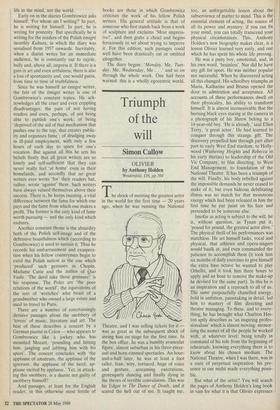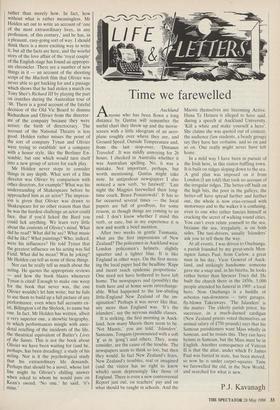Triumph of the will
Simon Callow
OLIVIER by Anthony Holden
Weidenfeld, £16, pp.504
The shock of meeting the greatest actor in the world for the first time — 20 years ago, when he was running the National Theatre, and I was selling tickets for it was as great as the subsequent shock of seeing him on stage for the first time. In the box office, he was a bumbly avuncular figure, almost suburban in his three-piece- suit and horn-rimmed spectacles. An hour- and-a-half later, he was at least a foot taller, lean, wiry, tortured, huge of voice and gesture, screaming execrations, grotesquely dancing and finally dying in the throes of terrible convulsions. This was his Edgar in The Dance of Death, and it scared the hell out of me. It taught me,
too, an unforgettable lesson about the subservience of matter to mind. This is the essential element of acting, the source of all its power and mystery: if you can fix your mind, you can totally transcend your physical circumstances. This, Anthony Holden's new biography makes clear, is a lesson Olivier learned very early, and one which he has spent his whole life proving.
He was a puny boy, emotional, and, in his own word, 'brainless'. Nor did he have any gift for sport. He was neither popular nor successful. When he discovered acting all this changed. His schoolboy triumphs as Maria, Katharine and Brutus opened the door to admiration and acceptance. All accounts of these performances dwell on their physicality, his ability to transform himself. It is almost inconceivable that the burning black eyes staring at the camera in a photograph of his Shrew belong to a 14-year-old boy. 'He is already,' said Ellen Terry, 'a great actor.' He had learned to conquer through this strange gift. The discovery propelled him through part after part to early West End stardom, to Holly- wood (Wuthering Heights and Rebecca in his early thirties) to leadership of the Old Vic Company, to film directing, to West End Management, to foundation of the National Theatre. It has been a triumph of the will. Finally, his body rebelled against the impossible demands he never ceased to make of it, but even hideous debilitating illness was no match for that monstrous energy which had been released in him the first time he put paint on his face and pretended to be someone else.
Insofar as acting is subject to the will, he is, without question, as Tynan put it, 'pound for pound, the greatest actor alive.' The physical thrill of his performances was matchless. He set himself tasks, vocal and physical, that athletes and opera-singers would baulk at, and even commanded the patience to accomplish them (it took him six months of daily exercises to give himself the extra bass octave he wanted to play Othello, and it took him three hours to apply and an hour to remove the make-up he devised for the same part). In this he is an inspiration and a reproach to all of us. The same purposefully chanelled energy, bold in ambition, painstaking in detail, led him to mastery of film directing and theatre managing. To these, and to every- thing, he has brought what Charlton Hes- ton aptly describes as 'an inspiring profes- sionalism' which is almost moving: memor- ising the names of all the people he worked with, at whatever level; being totally in command of his role from the beginning of rehearsals; knowing everything there is to know about his chosen medium. The National Theatre, when I was there, was in a state of perpetual inspiration: his pre- sence in our midst made everything possi- ble.
But what of the artist? You will search the pages of Anthony Holden's long book in vain for what it is that Olivier expresses
rather than merely how. In fact, how without what is rather meaningless. Mr Holden set out to write an account of 'one of the most extraordinary lives, in any profession, of this century,' and he has, in a pleasant, easy-going sort of way. I should think there is a more exciting way to write it, but all the facts are here, and the woeful story of the love affair of the 'royal couple' of the English stage has found an appropri- ate chronicler. There are a number of new things in it — an account of the shooting script of the Macbeth film that Olivier was never able to get backing for and a passage which shows that he had stolen a march on Tony Sher's Richard III by playing the part on crutches during the Australian tour of '48. There is a good account of the fateful decision of the Old Vic Board to dismiss Richardson and Olivier from the director- ate of the company because they were actors: the birth of directocracy. The account of the National Theatre is less good. Holden rather misses the point of the sort of company Tynan and Olivier were trying to establish: not a company with a house style, like the Berliner En- semble, but one which would turn itself into a new group of actors for each play.
Mr Holden never stops to consider things in any depth. What sort of a film director was Olivier by comparison with other directors, for example? What was his understanding of Shakespeare before he approached him as an actor? The impress- ion is given that Olivier was drawn to Shakespeare for no other reason than that he was the hardest challenge an actor could face, that if you'd licked the Bard you could lick anything. We learn very little about the contents of Olivies mind. What did he read? What did he see? What music did he like? What paintings? Who, indeed, were his influences? He told Tynan that the greatest influence on his acting was Sid Field. What did he mean,? Was he joking? Mr Holden can tell us none of these things.
Nor can he really tell us much about the acting. He quotes the appropriate reviews — and how the book blazes whenever Tynan is cited! Enough to make one weep for the book that never was, the one Olivier wouldn't let him write; but he fails to use them to build up a full picture of any performance, even when full accounts ex- ist, Billington's of the Shylock, to name but one. In fact, Mr Holden has written, albeit a very superior one, a showbiz biography, in which performances mingle with anec- dotal retelling of the incidents of the life, the theatrical equivalent of Butler's Lives of the Saints. This is not the book about Olivier we have been waiting for (and he, perhaps, has been dreading): a study of his acting. Nor is it the psychological study that his extraordinary life demands. Perhaps that should be a novel, whose last line might be Olivier's chilling answer when asked to whom he would pass on Kean's sword: 'No one,' he said, 'it's mine.'



















































 Previous page
Previous page